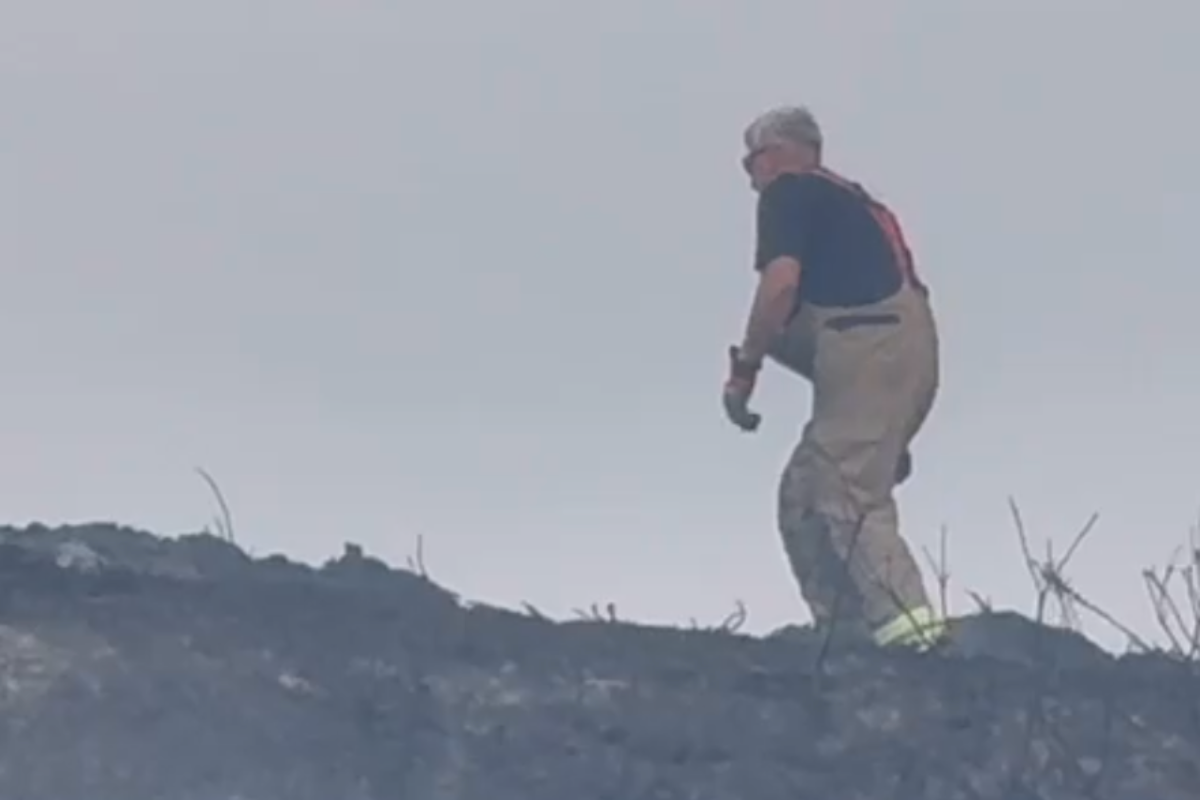"If something goes wrong, there shouldn't be multiple deaths. I should be the only one."
Where once Islamic State ruled the land, the black flag of its caliphate heralding unspeakable violence and horrors in the city of Raqqa, now people are trying to return to normal lives.
But left behind are landmines, IEDs (improvised explosive devices), booby traps and other explosives that pose a deadly threat to civilians - years after the terror group was driven out of its former capital.
All over Syria, hundreds of thousands of people are returning to their homes after the fall of dictator Bashar al Assad. But the landscape is scarred with unexploded ordnance installed not just by IS, but by multiple sides in the decade-long civil war.
Mine disposal expert Sunil Thapa knows that every moment he works could be his last.
He is one of the most experienced ordnance disposal experts in the world, having defused explosives by hand for the last 19 years.
As he works in warzones across the globe, he thinks of his family and the colleagues whose lives the job has claimed over the years.
His day in Raqqa starts early, at 6am.
"Once you move out of your house, you can see the remnants of war," the 39-year-old tells Sky News.
"You cannot see a single house in Raqqa that is in good condition. They are destroyed or you can see the footprints of explosive ordnance or bullets.
"When you go out, it disturbs your mind. It's easy to imagine the ISIS (IS) occupation, how brutal fighting happened in this area. It will take years and years to rebuild."
Sunil and his colleagues are only allowed to stray 300 metres from their accommodation for security reasons when not at work. But it's a work day, so he's headed out to the Mines Advisory Group's (MAG) operational base.
There he briefs the teams and decides where to go first. There are often multiple sites in the area that need his expertise in defusing mines and explosives, so he has to prioritise.
"I go where I am needed most. The teams' job is to detect the threat - landmines, cluster munitions or IEDs - it's solely my responsibility to defuse them."
He arrives at his first call of the day and instructs colleagues on what happens next, telling them how far the exclusion zone needs to be.
"The safety distance should be 100 metres for an anti-vehicle mine and 50 metres for an anti-personnel mine.
"Because while defusing explosives, if something goes wrong, there shouldn't be multiple deaths. I should be the only one.
"I have dealt with thousands and thousands, I don't even remember the numbers I have disarmed.”
Sunil shows Sky News an anti-vehicle mine that he has already made safe, talking through how he went about defusing it.
Step by step, he explains how he removed the rubber cap before turning elements of the mine in various directions to fully neutralise the explosive.
"But every time, before I reach to disarm, the first thing that comes into your mind is you remember your family. Then you beg to your God: 'This time please allow me to go and meet my family'."
He adds: “If people say they are not scared, they are probably lying. No matter how skilled you are, or how much experience you have, you just need a bad day to get killed.
"If I’m holding an anti-personnel mine and it slips from my hand and hits the ground with enough force, it will detonate."
Sunil, from western Nepal, started out in the Nepali Army, disposing of landmines on two UN peacekeeping missions in Haiti and Mali.
Now he works for MAG, a global humanitarian organisation that finds, removes and destroys landmines, cluster munitions and unexploded bombs from places affected by conflict.
The group, which was supported by Princess Diana, was this week awarded the Conrad N Hilton Humanitarian Prize, the highest global humanitarian award recognising non-profits worldwide dedicated to alleviating human suffering.
Chief executive Darren Cormack said the prize is "recognition of the tireless and courageous work of our global staff".
Read more:
British girl returns to UK from ISIS detention camp in Syria
CCTV shows hospital volunteer being shot dead in Syria
The scale of MAG’s challenge in Syria is staggering.
Since the fall of Assad there have been more than 1,100 casualties from landmines and unexploded ordnance, including nearly 500 deaths, according to data from the INSO humanitarian organisation.
And the situation could get worse. Already this year more than half a million Syrians have returned to their homes. This is expected to rise to two million by the end of 2025, the UN says.
Sunil does the job for his wife and son, who live back home in Nepal. He says he will likely retire from his frontline job in a few years to spend more time with them.
After starting at 6am and working for hours in the hot sun, Sunil usually gets home around 2.30pm.
There are two restaurants he is allowed to visit in the small 300-metre secure zone around where he lives.
He sleeps for a couple of hours before dinner, exhausted from the day's work in the field, and does a workout before turning in for the night.
The next day, he will again be up at 6am, ready to continue his dangerous but crucial work making Raqqa safer for its people. One landmine at a time.

(c) Sky News 2025: 'You just need a bad day to get killed': Defusing death in the former IS terror capital




 Why is Zelenskyy bringing a posse of European leaders to the US for peace talks?
Why is Zelenskyy bringing a posse of European leaders to the US for peace talks?
 Protesters go on strike in Israel demanding ceasefire and release of Gaza hostages
Protesters go on strike in Israel demanding ceasefire and release of Gaza hostages
 Zelenskyy knows he risks another Oval Office ambush - but has to be a willing participant in peace talks
Zelenskyy knows he risks another Oval Office ambush - but has to be a willing participant in peace talks
 In maps: The territory Ukraine could be told to surrender in a 'land for peace' deal
In maps: The territory Ukraine could be told to surrender in a 'land for peace' deal
 Starmer to meet European leaders for 'coalition of the willing' talks on Ukraine
Starmer to meet European leaders for 'coalition of the willing' talks on Ukraine
 Remaining hospitals in Gaza overwhelmed with malnutrition cases
Remaining hospitals in Gaza overwhelmed with malnutrition cases
 Hurricane Erin reaches wind speeds of up to 160mph near Caribbean
Hurricane Erin reaches wind speeds of up to 160mph near Caribbean
 Trump-Putin summit: No deal reached to end war in Ukraine
Trump-Putin summit: No deal reached to end war in Ukraine
 In pictures: Trump-Putin summit ends without a deal but with plenty of standout moments
In pictures: Trump-Putin summit ends without a deal but with plenty of standout moments











